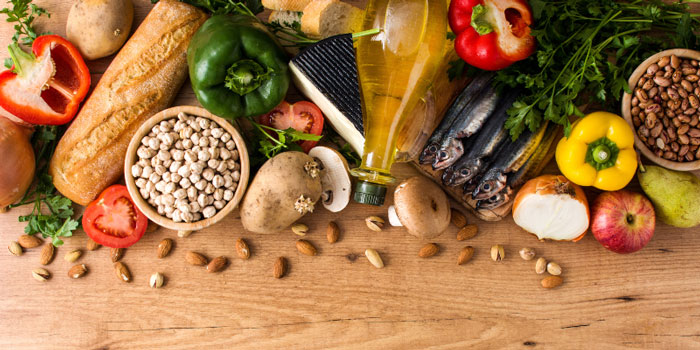We know that taking care of our heart is extremely important, and lots of factors influence our heart health, like our diet, activity level, and even mental health. When it comes to our diet, eating heart healthy comes with visions of bland food, zapped of all flavor—but there are plenty of dishes that can make our hearts and stomachs happy. The Mediterranean Diet is one way we can take care of our heart with proven and delicious benefits.
What is the Mediterranean Diet?
The Mediterranean Diet is based on the foods of the countries that border the Mediterranean Sea, like Italy, Greece, Turkey, Monaco, Lebanon, and Morocco. This “diet” isn’t quite like some other diets with strict rules and limits on certain foods—it’s based on the building blocks of the dishes eaten in this part of the world, such as:
- Fruits and vegetables
- Unsaturated fats, such as those found in olive oil and fatty fish like mackerel and salmon
- Legumes, like chickpeas, kidney beans, and lentils
- Whole grains
- Nuts and seeds
- Herbs and spices
While the Mediterranean Diet doesn’t eliminate any food, it generally doesn’t include a lot of the following:
- Red meat
- Processed foods and grains
- Dairy
The Mediterranean Diet is considered a plant-based diet because meals are built around fruits, vegetables, nuts, beans, and whole grains, with moderate usage of poultry, fish, eggs, and dairy.
How Does the Mediterranean Diet Support Heart Health?
Interest in the Mediterranean Diet took hold in the United States in the 1960s when scientists noticed that there were far fewer coronary heart disease-related deaths in this part of the world. Many studies following this observation found that the regular diet of the people in the Mediterranean was associated with reduced risk factors for cardiovascular disease.
How is that? Mediterranean dishes are comprised of plenty of heart healthy foods that are packed with antioxidants, unsaturated fats, vitamins, fiber, and phenolic compounds that help fight inflammation and keep cholesterol levels in check. Here’s some of the heart-healthy benefits of foods in the Mediterranean diet:
Fruits and vegetables
In addition to being high in vitamins and minerals, fruits and vegetables like carrots and tomatoes contain carotenoids, which also act as an antioxidant. Antioxidants help balance out damaging free radicals that often cause chronic inflammation.
Herbs and spices
Using herbs and spices to flavor food reduces the use of salt, lowering our sodium intake. Additionally, herbs like oregano and rosemary contain rosmarinic acid, which has anti-inflammatory properties. One study also found that ginger improves the body’s sensitivity to insulin, and consuming 3 grams of ginger daily helped improve the fasting blood sugar levels of individuals with type 2 diabetes.
Olive oil
Particularly extra virgin olive oil, which is “fresh squeezed” and doesn’t go through additional processing, is high in the anti-inflammatory phenolic compound, polyphenol. EVOO with a slightly bitter taste has the highest level of polyphenols. The European Food Safety Authority recommends 1 1/2 tablespoons of olive oil daily, but don’t worry about eating this stuff right out of the bottle—use it in a salad dressing, pan-fry fish or chicken in olive oil, or mix it with some spices to dip with toasted whole grain bread as a snack. Additionally, olive oil is a monounsaturated fat, which has been shown to improve cholesterol levels.
Nuts and seeds
Nuts and seeds also contain cholesterol-lowering monounsaturated fat as well as antioxidants. People who eat nuts regularly are less likely to develop metabolic syndrome, which is a combination of high blood pressure, high blood sugar, and excess abdomen fat, all of which are risk factors for heart disease and type 2 diabetes.
Fish and seafood
Fatty fish like salmon, mackerel, sardines, and rainbow trout are high in omega-3s, which is a polyunsaturated fat. Omega-3s are known to decrease levels of triglycerides and reduce blood clotting, which decreases the risk of heart failure or stroke.
Whole Grains
The refining process for grains removes both the outer shell of the grain and the innermost layer (the “germ”). Whole grains retain the entire grain, which is important for heart health because these outer and inner layers are packed with antioxidants. Additionally, whole grains contain lots of fiber that is beneficial to our gut health.
Legumes
Legumes are plants and the seeds of plants that form in a pod, such as beans, peas, lentils, and peanuts. They contain vitamin B as well as a lot of protein, making them a good substitute for meat in some dishes and the perfect snack to quell that mid-afternoon hunger.
Getting Started With the Mediterranean Diet
If you want to try the Mediterranean Diet, you can start by swapping out your usual ingredients with some those in the diet, like using olive oil instead of butter, or flavoring dishes with herbs and spices instead of salt. Or, the next time you need bread, pick up a whole grain loaf instead of white.
Try out some simple dishes, too, to get started with cooking Mediterranean ingredients. Check out these:
- Baked Salmon with Garlic Cilantro Sauce: If you’ve never cooked salmon before, this dish is a great introduction. With only a few ingredients, this dish cooks on one sheet pan, saving the mess as well as boosting your heart health.
- Easy Greek Chicken Kebabs: The simple marinade in this recipe is delicious and packed with heart-healthy Mediterranean ingredients like lemon, Greek yogurt, oregano, garlic, and olive oil.
- Mediterranean Herb Shrimp with Penne: Remember the Mediterranean Diet doesn’t eliminate any foods? Enjoy this creamy, cheesy pasta dish with Neufchátel, parmesan, and asiago cheeses that are delicious and naturally low in fat.
Eating heart healthy doesn’t mean exchanging flavorful foods for the benefit of your health. With the Mediterranean Diet, there’s a whole sea of possibilities for tasty dishes that’ll have your heart and your stomach saying thank you!





